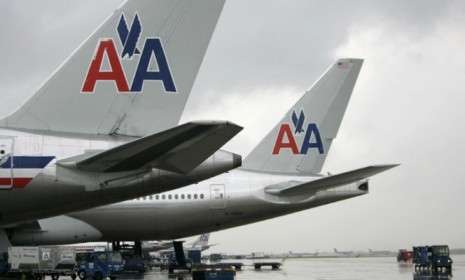American Airlines' 'painful' bankruptcy: Winners and losers
The debt-plagued airline's parent company files for Chapter 11. That's good news for competitors, but bad news for unions and frequent flyers

A free daily email with the biggest news stories of the day – and the best features from TheWeek.com
You are now subscribed
Your newsletter sign-up was successful
Faced with mounting debt from high fuel costs and expensive union contracts, American Airlines' parent company, AMR Corp., filed for Chapter 11 bankruptcy protection Tuesday morning in New York. American is the last of the big, full-fare U.S. airlines to file for bankruptcy, with the troubled airline finally seeking the refuge that its competitors, like Delta and United, took advantage of years ago. "They will have to go through the whole process that their peers have gone through," says aviation analyst John Strickland. "It's painful but probably necessary." Who benefits from American's troubles, and who loses out? Here, a brief rundown:
WINNERS
Other U.S. airlines
The Week
Escape your echo chamber. Get the facts behind the news, plus analysis from multiple perspectives.

Sign up for The Week's Free Newsletters
From our morning news briefing to a weekly Good News Newsletter, get the best of The Week delivered directly to your inbox.
From our morning news briefing to a weekly Good News Newsletter, get the best of The Week delivered directly to your inbox.
This move could benefit the entire airline industry. American will likely streamline its operations and routes, allowing "competitors to keep load factors and pricing higher," says Helane Becker of Dahlman Rose & Co. Plus, "strong U.S. airlines such as Delta and United Continental are in a position to increase their market share vis-à-vis American as the latter focuses on its reorganization," sats Michael Linenberg at Deutsche Bank. The stock of competing airlines might also go up because of American's bankruptcy.
Foreign airlines
With American struggling, international carriers could jump on the opportunity to expand their share of the market, says Sasha Bogursky at Fox News. "Cash-rich and profitable airlines such as Emirates [could] expand into U.S. markets, siphoning traffic on high-profit international routes and luring high-paying business travelers."
Today's passengers
A free daily email with the biggest news stories of the day – and the best features from TheWeek.com
In a statement, the airline said the bankruptcy filing won't affect "business as usual." Flight schedules will remain unchanged, and reservations and frequent flyer miles will still be honored. At AZCentral.com, Dawn Gilbertson notes that if bookings drop because nervous passengers choose to fly other airlines, American may try to lure more fliers by offering lower fares — a win for consumers, at least for now.
LOSERS
Tomorrow's passengers
In the end, American will wind up "shrinking in bankruptcy court, so travelers' favorite route, departure time, or even hub might be eventually eliminated as the airline prunes unprofitable flying," says Gilbertson. American may also merge with US Airways. Either way, the result will likely be less competition amongst all the airlines, and in the long run, higher prices for customers.
Airline employees
Unsustainable labor costs are one of the key reasons for AMR's filing, and "the bankruptcy may allow [the company] to drive a harder bargain with unions," says Avi Salzman at Barron's. The airline has been in talks with its pilots union about cutting costs for five years, but little headway has been made, notes P.C. at The Economist. Now, with American's imminent restructuring, pilots' pension benefits are likely to be cut. Others warn that salaries may be slashed, too.
Frequent flyers
American promises that it will continue to honor and award frequent flyer miles. But travel experts warn that it may get harder to redeem miles. Many flights are already nearly full, and the airline may hesitate to fill remaining seats with non-paying customers. "People should use up their frequent flier miles and, if they can, book on co-chair partners who aren't filing for bankruptcy," says Katie Hanni of FlyersRights.org. "The passengers are the last creditor on the list and the last to know."
-
 Can foster care overhaul stop ‘exodus’ of carers?
Can foster care overhaul stop ‘exodus’ of carers?Today’s Big Question Government announces plans to modernise ‘broken’ system and recruit more carers, but fostering remains unevenly paid and highly stressful
-
 6 exquisite homes with vast acreage
6 exquisite homes with vast acreageFeature Featuring an off-the-grid contemporary home in New Mexico and lakefront farmhouse in Massachusetts
-
 Film reviews: ‘Wuthering Heights,’ ‘Good Luck, Have Fun, Don’t Die,’ and ‘Sirat’
Film reviews: ‘Wuthering Heights,’ ‘Good Luck, Have Fun, Don’t Die,’ and ‘Sirat’Feature An inconvenient love torments a would-be couple, a gonzo time traveler seeks to save humanity from AI, and a father’s desperate search goes deeply sideways